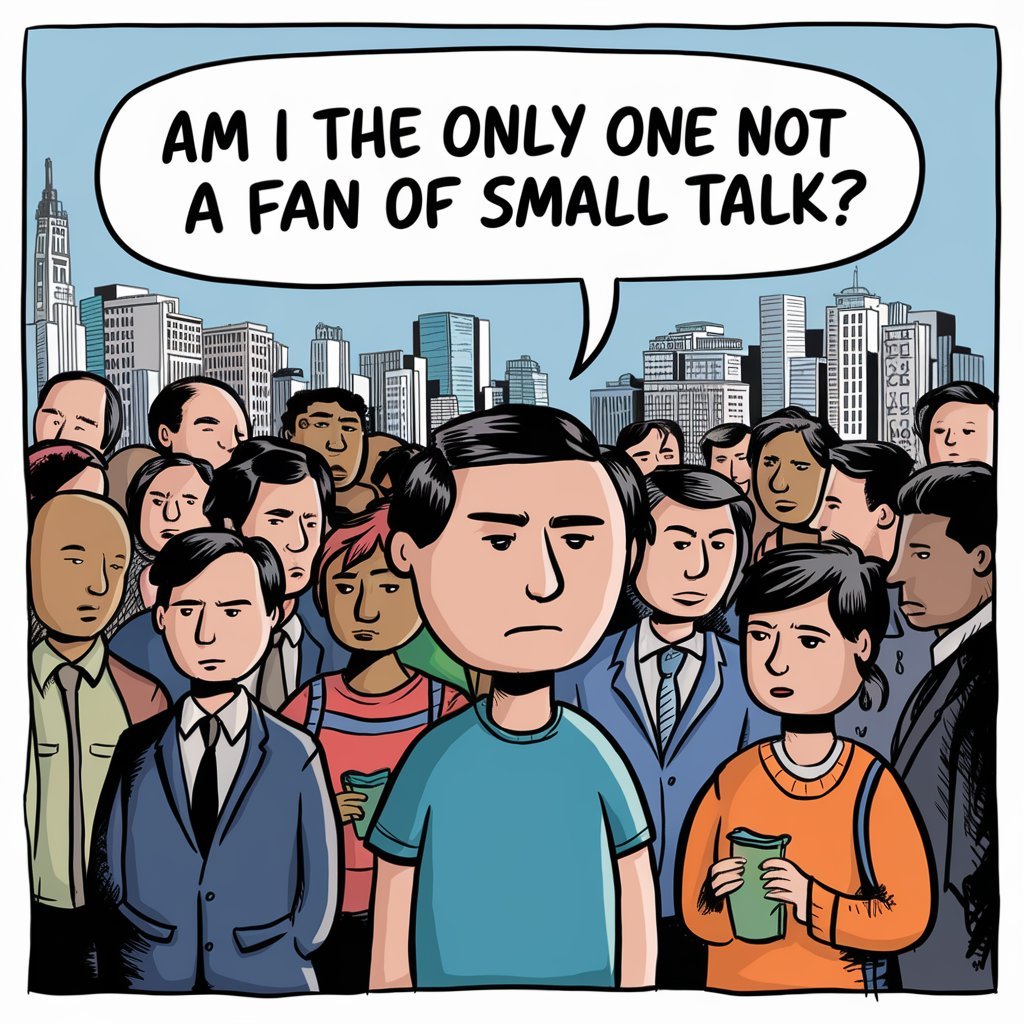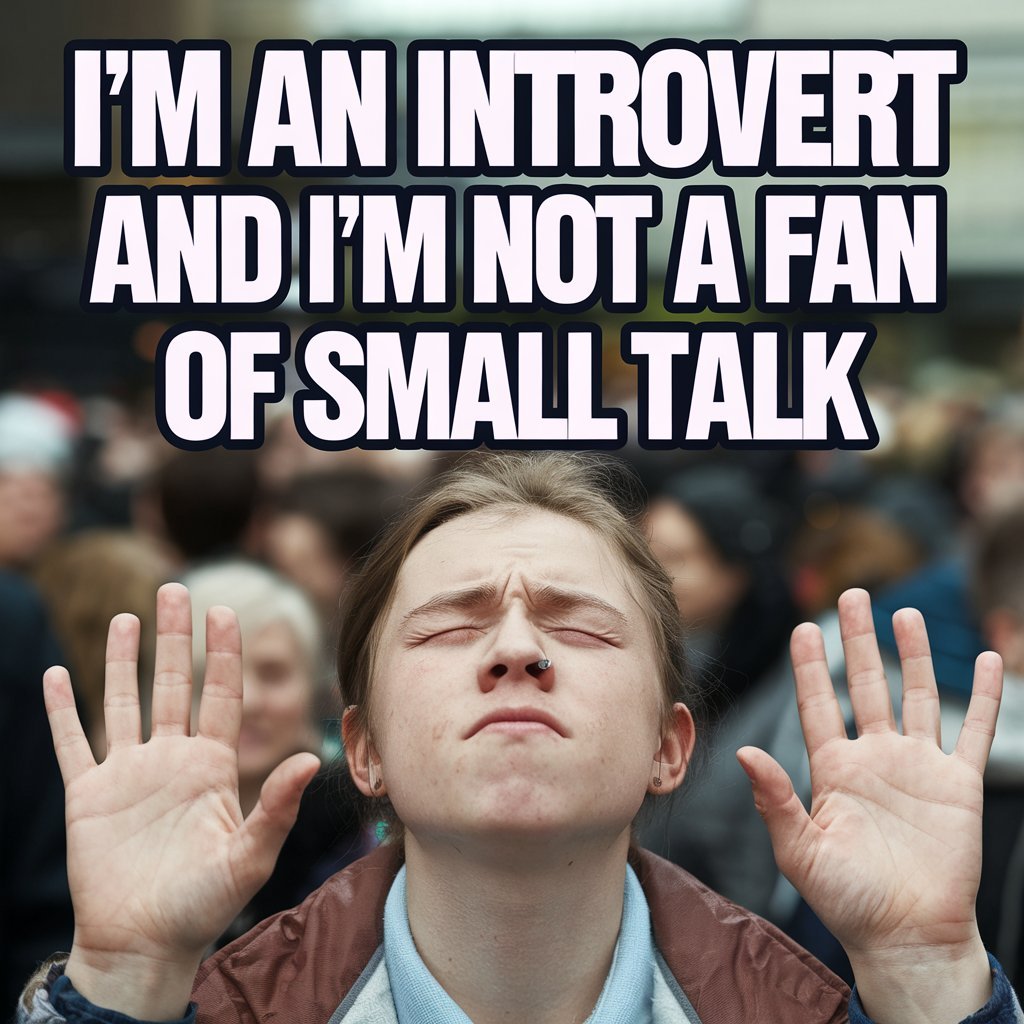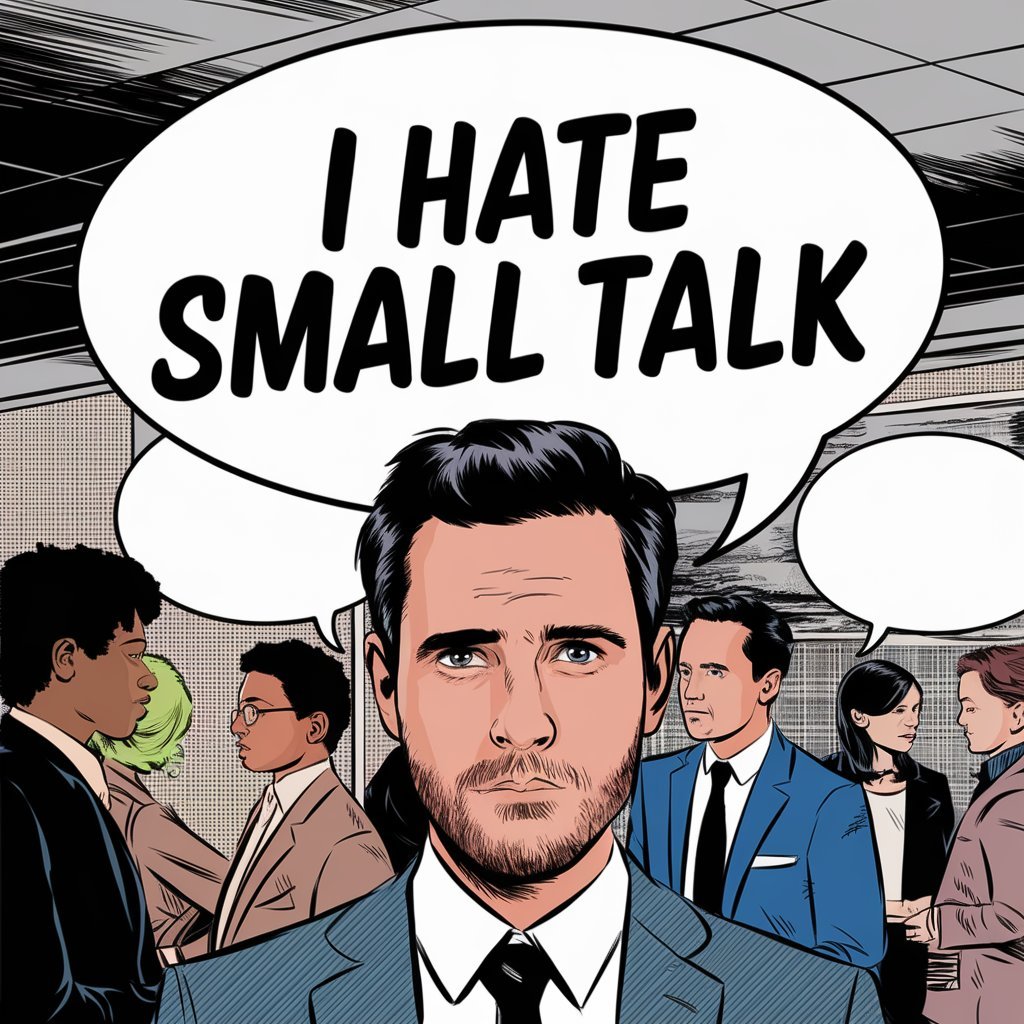Disclaimer: This post may contain affiliate links, meaning we get a small commission if you make a purchase through our link at no extra cost to you. For more information, please visit our Disclaimer Page.
Why do introverts hate small talk? This question often comes up because introverts tend to shy away from surface-level conversations.
For many introverts, small talk feels draining and unfulfilling, lacking the depth and meaning they crave in interactions. They prefer conversations that allow for genuine connection, where they can explore ideas and share personal insights.
Small talk often feels like a barrier, preventing the more meaningful discussions they value.
In this blog, we’ll explore why small talk can feel so exhausting for introverts and offer some tips for creating conversations that feel more authentic and satisfying.
But why do introverts hate small talk so much?
It’s not just about being shy or antisocial. There’s a deeper psychological reason behind this aversion, and understanding it can be the key to navigating social situations more comfortably.
If you’re an introvert looking for ways to cope or an extrovert trying to understand your quieter friends, this blog post will shed light on the introvert’s perspective on small talk and offer practical alternatives.
Why Small Talk Drains Introverts
- Cognitive Overload
- Rapid exchanges overwhelm your mind, which prefers deep processing.
- Lack of Meaning
- You crave depth, so surface-level chatter feels unsatisfying and draining.
- Social Pressure
- The expectation to perform adds unnecessary stress.
- Limited Processing Time
- Small talk moves too fast for the thoughtful responses you prefer.
- Emotional Labor
Putting on a “social mask” exhausts you, as it contrasts with your desire for authenticity but rather a natural consequence of your introverted nature.
The Impact of Small Talk on Introverts
How Small Talk Affects Introverts
- Emotional Exhaustion
- Small talk drains energy due to overstimulation and pressure to perform.
- It leaves you craving deeper connections and needing solitude to recharge.
- Increased Anxiety
- Worrying about interactions, fear of judgment, and overthinking are common.
- Anxiety may lead to avoiding social situations, but it doesn’t reflect your worth.
- Reduced Focus
- Small talk disrupts concentration and drains mental energy.
- You might avoid situations to preserve focus, seeking quiet spaces for productivity.
- Misconceptions
Clear communication can prevent misunderstandings and foster genuine connections
Others may see you as aloof, uncooperative, or shy.
Alternatives to Small Talk for Introverts
Small talk can feel draining, but you can create meaningful interactions by leaning into deeper conversations.
Ask Thought-Provoking Questions
“What’s a life lesson that shaped who you are today?”
“What’s the one change you’d make to improve the world?”
“Which book or film had a lasting impact on you?”
Explore Shared Passions
Listen for cues about hobbies or interests. Ask follow-up questions to dive deeper. Share your own experiences.
Discuss Big Ideas and Concepts
Share interesting facts or discoveries. Reference a recent article, podcast, or book. Pose “what if” scenarios or discuss current events.
Master Active Listening
Maintain eye contact and open body language. Paraphrase key points to confirm understanding.
Ask follow-up questions for clarity.
Validate emotions by acknowledging feelings.
Avoid interrupting the speaker.
Navigating Social Situations as an Introvert
Social situations can feel challenging, but with the right strategies, you can engage authentically and comfortably.
Prepare Conversation Topics
- Stay informed about current events.
- Reflect on recent experiences or interests.
- Think about the context of the event.
- Prepare open-ended questions to encourage deeper discussions.
For example, before a work event, read industry news to shift conversations toward meaningful topics.
Set Boundaries and Manage Energy
- Communicate your need for alone time.
- Take breaks during long events to recharge.
- Limit social commitments to avoid burnout.
- Practice politely declining invitations when needed.
Setting boundaries ensures you stay present without feeling drained.
Connect with Like-Minded People
- Attend events, clubs, or groups that match your passions.
- Volunteer for causes you care about.
- Engage in online forums and communities.
Shared interests lead to more energizing, meaningful connections.
Embrace Silence and Pauses
- Use silence to reflect and process thoughts.
- Create space for deeper ideas to emerge.
- Reduce pressure by allowing conversations to flow naturally.
- Demonstrate active listening by being comfortable with pauses.
Silence often fosters more authentic exchanges.
Leverage Online Communication Platforms
- Build relationships gradually through online interaction.
- Use writing to express your thoughts clearly.
- Join digital communities to find like-minded individuals.
- Use online conversations to prepare for in-person meetings.
Platforms such as LinkedIn, social groups, and messaging apps can support meaningful engagement.
By applying these strategies, you can enjoy social interactions that feel natural and align with your introverted strengths.
Changing Perceptions About Small Talk
Shifting your view on small talk can enhance social interactions for both introverts and extroverts.
Educating Others About Introvert Needs
Many may not understand introverts’ preferences. You can help by:
- Explaining your energy levels: Socializing can be draining; you recharge differently.
- Expressing your preference for depth: Value meaningful conversations over small talk.
- Communicating your need for preparation: Share that you may need time to process thoughts.
- Emphasizing your strengths: Highlight your skills in deep, one-on-one conversations.
This awareness can lead to more comfortable interactions.
Reframing Small Talk as a Bridge
View small talk as a pathway to deeper conversations:
- Ice-breaker: It reduces awkwardness and sets a comfortable tone.
- Discovering common ground: Casual chats reveal shared interests.
- Building trust: Light conversation gauges openness and comfort.
- Facilitating transitions: Small talk can smoothly lead to deeper discussions.
This perspective allows you to see small talk as a useful tool.
Encouraging Meaningful Interactions
You can guide conversations toward more fulfilling topics by:
- Asking thought-provoking questions: Open-ended questions invite deeper discussions.
- Sharing personal insights: Offering your perspective adds richness.
- Practicing active listening: Show interest with follow-up questions.
- Creating intimate settings: Suggest smaller group chats for deeper dialogue.
- Introducing engaging topics: Steer the conversation to subjects you enjoy.
Taking the initiative encourages others to engage more meaningfully.
Celebrating Introvert Strengths
Your introverted nature brings unique strengths:
- Thoughtfulness: You contribute insightful ideas.
- Empathy: You excel at listening and noticing emotions.
- Depth of knowledge: You offer well-informed perspectives.
- One-on-one expertise: You thrive in personal conversations.
- Observational skills: You notice details that enrich discussions.
Recognizing these strengths can boost your confidence in social settings.
Creating Balance in Social Dynamics
The goal is to balance small talk and meaningful dialogue. By educating others and fostering deeper interactions, you can transform social dynamics.
Your introverted qualities are valuable assets that lead to more authentic connections.
Introverts: I hate small talk meme





Conclusion: Why do introverts hate small talk?
For introverts, small talk often feels like an exhausting exercise rather than a fulfilling interaction.
Many introverts crave depth, meaning, and authenticity in their connections, making surface-level conversations feel draining.
By understanding why small talk is challenging—be it cognitive overload, social pressure, or the desire for genuine engagement—introverts can empower themselves to navigate social situations more comfortably.
Embracing strategies like asking thought-provoking questions, setting clear boundaries, and preparing meaningful conversation starters can make a world of difference.
These techniques enable introverts to build connections that resonate with their values, allowing them to conserve energy and enjoy interactions that feel enriching rather than depleting.
Remember, introversion is a strength that brings valuable perspectives and insights to relationships, so don’t shy away from connecting in a way that feels true to you.





